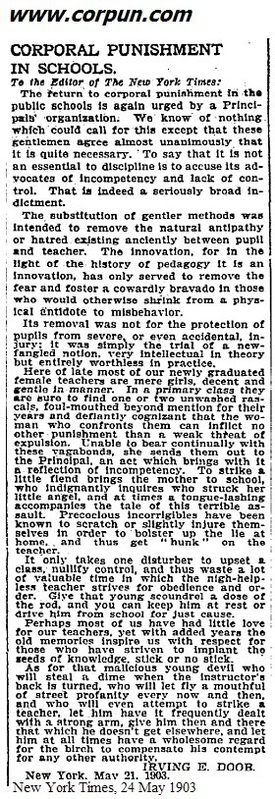|
Corpun file 19676

The New York Times, 24 May 1903
Corporal Punishment In Schools.
 To the Editor of The New York Times: To the Editor of The New York Times:
The return to corporal punishment in the public schools is
again urged by a Principals' organization. We know of nothing
which could call for this except that these gentlemen agree
almost unanimously that it is quite necessary. To say that it is
not an essential to discipline is to accuse its advocates of
incompetency and lack of control. That is indeed a seriously
broad indictment.
The substitution of gentler methods was intended to remove the
natural antipathy or hatred existing anciently between pupil and
teacher. The innovation, for in the light of the history of
pedagogy it is an innovation, has only served to remove the fear
and foster a cowardly bravado in those who would otherwise shrink
from a physical antidote to misbehavior.
Its removal was not for the protection of pupils from severe,
or even accidental, injury; it was simply the trial of a
new-fangled notion, very intellectual in theory but entirely
worthless in practice.
Here of late most of our newly graduated female teachers are
mere girls, decent and gentle in manner. In a primary class they
are sure to find one or two unwashed rascals, foul-mouthed beyond
mention for their years and defiantly cognizant that the woman
who confronts them can inflict no other punishment than a weak
threat of expulsion. Unable to bear continually with these
vagabonds, she sends them out to the Principal, an act which
brings with it a reflection of incompetency. To strike a little
fiend brings the mother to school, who indignantly inquires who
struck her little angel, and at times a tongue-lashing
accompanies the tale of this terrible assault. Precocious
incorrigibles have been known to scratch or slightly injure
themselves in order to bolster up the lie at home, and thus get
"hunk" on the teacher.
It only takes one disturber to upset a class, nullify control,
and thus waste a lot of valuable time in which the nigh-helpless
teacher strives for obedience and order. Give that young
scoundrel a dose of the rod. and you can keep him at rest or
drive him from school for just cause.
Perhaps most of us have had little love for our teachers, yet
with added years the old memories inspire us with respect for
those who have striven to implant the seeds of knowledge, stick
or no stick.
As for that malicious young devil who will steal a dime when
the instructor's back is turned, who will let fly a mouthful of
street profanity every now and then, and who will even attempt to
strike a teacher, let him have it frequently dealt with a strong
arm, give him then and there that which he doesn't get elsewhere,
and let him at all times have a wholesome regard for the birch to
compensate his contempt for any other authority.
Irving E. Doob.
New York, May 21, 1903.
| 

![]()